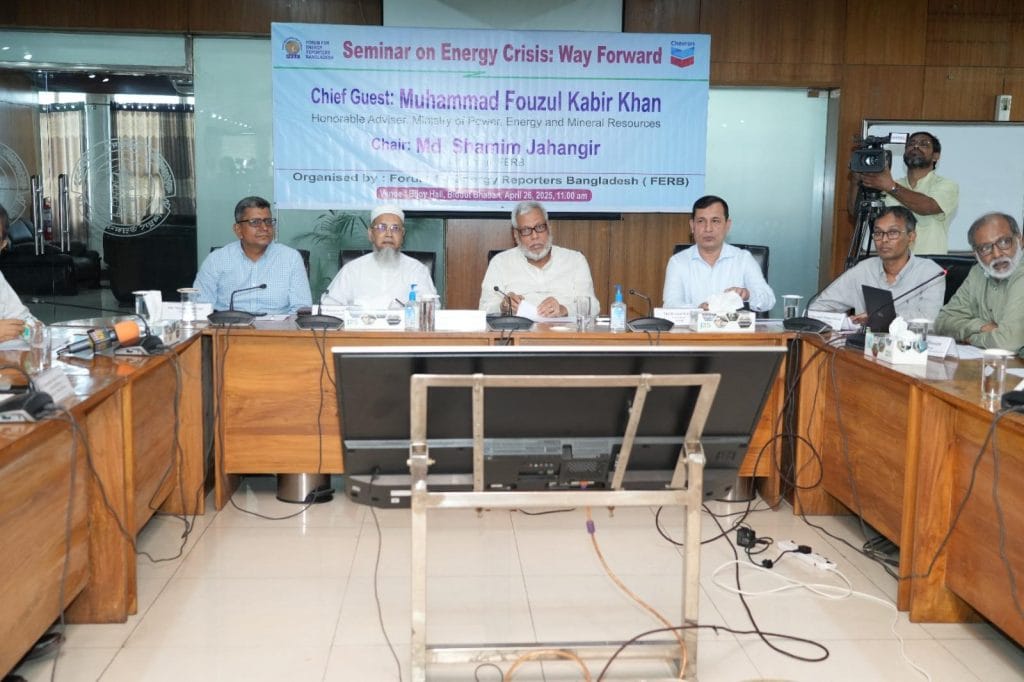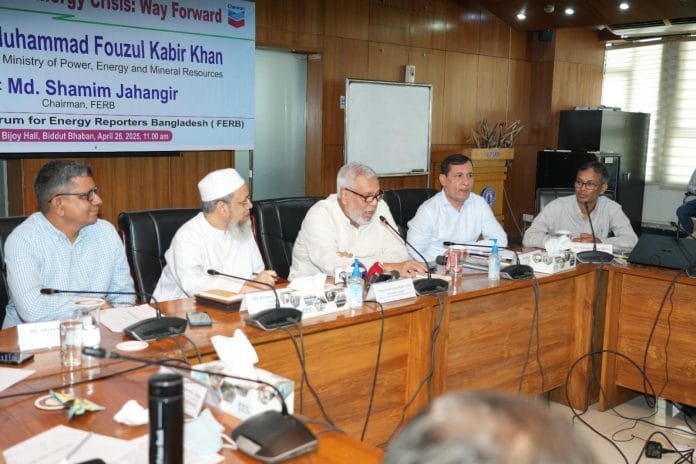Power and Energy Adviser Muhammad Fouzul Kabir Khan has assured that while some power outages are inevitable this summer, load shedding will be kept within a tolerable level and distributed equally between urban and rural areas.
“I won’t say there will be no power outage during the summer, but load shedding will remain at a manageable level. There will be no discrimination between urban and rural areas,” he said at a seminar titled ‘Energy Crisis: Way Forward’ organised by the Forum for Energy Reporters Bangladesh (FERB) at Bidyut Bhaban in Dhaka on Saturday.
Bangladesh’s power demand is expected to peak at 18,000MW during the summer, compared to a current generation capacity of slightly over 16,000MW. The adviser said the shortfall would be met through increased coal and LNG imports.
He also echoed energy analysts’ view that some load shedding can be beneficial, as it helps avoid higher power tariffs.
Addressing concerns that the interim government’s move to clear outstanding power and energy sector payments would significantly increase subsidy burdens, Fouzul said next year there would be no liabilities.
“No one wants to do business with a country that fails to pay its bills. We had fiscal space this year, and we wanted to get out of that pit,” he explained.
The adviser criticised the current “extortionist” tariff structure in the power sector, saying it allowed some private power companies to make excessive profits and pay lavish bonuses.
“Some companies behave as if they were Apple or Google. We are working to establish a logical tariff structure,” he said.
He mentioned that the tariff for the Matarbari power plant has been set at Tk8.45 per unit, which will serve as a benchmark for renegotiating tariffs at other coal-fired power plants.
“We want to restructure power tariffs in a democratic way, not by force,” he added.
Fouzul also defended the recent industrial gas price hike, saying it was intended to better allocate resources and promote energy-efficient technologies. He reaffirmed the government’s commitment to ensuring there is no discrimination in the power and energy sector.
On his recent visit to Qatar, he said the country has assured Bangladesh of supplying LNG at a lower cost in the future, provided Bangladesh increases its import volume.

Deepening Energy Crisis and Solutions
In his keynote presentation, energy expert Dr Ijaz Hossain traced Bangladesh’s ongoing energy crisis back to 2019, when gas production began declining and expensive oil imports increased subsidy burdens.
“Gas reserves were depleting, but exploration efforts were neglected. Instead, LNG imports were prioritized when aggressive domestic exploration was needed,” he said.
Domestic gas production has dropped to around 1,800MMcfd from 2,786MMcfd recorded on May 6, 2015.
So far, nearly 15 Tcf of gas has been consumed, with only 2 Tcf added since 1997 from the Bibiyana gas field. Without new discoveries, the remaining 9 Tcf could be depleted by 2031, Dr Ijaz warned.
To ensure energy security, Bangladesh must maintain a production rate of at least 2,000MMcfd by drilling 10 wells annually, he suggested. After 2030, the country will also need to import 2,600MMcfd of LNG annually, requiring the establishment of two additional floating storage and regasification units (FSRUs).
Furthermore, over 12 million tonnes of coal will be needed annually for power generation, along with an additional four million tonnes for brick kilns — putting heavy pressure on foreign exchange reserves.
“Load shedding is far better than unsustainable subsidies and tariff hikes,” Dr Ijaz argued, suggesting that domestic and CNG gas supplies should be phased out over the next decade, beginning with well-off households. He also urged immediate offshore gas exploration, noting that Myanmar’s gas fields are close to Bangladesh’s maritime boundaries.
Call for Reforms in Energy Policy
Dr Golam Moazzem, Research Director at the Centre for Policy Dialogue (CPD), called for a new energy policy aligned with long-term energy transition and security goals targeting 2041 and 2050.
He criticised recent government measures to tackle the energy crisis, saying they conflict with the country’s “three-zero” policy commitments.
Calling the Integrated Power and Energy Master Plan (IPEMP) flawed, he said the plan’s energy demand projections were manipulated for political advantage.
Dr Moazzem recommended prioritising investment in gas exploration over LNG imports.
Meanwhile, Dr Shamsul Alam, Adviser to the Consumer Association of Bangladesh (CAB), warned that Bangladesh is fast becoming an LNG-dependent nation. By 2030, domestic natural gas’s share in the national mix could shrink from 75 percent to just 25 percent, he said.
Petrobangla Chairman Rezanur Rahman and PDB Chairman Rezaul Karim also attended the seminar, which was moderated by FERD Executive Director Sherajul Islam and chaired by FERB Chairman Md Shamim Jahangir.

